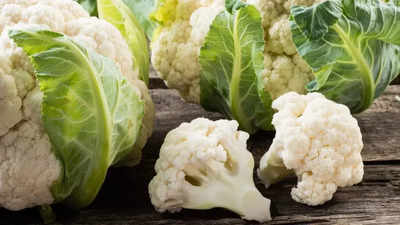- News
- lifestyle
- health-fitness
- diet
- Unknown side effects of cauliflower to watch out for
Trending
Unknown side effects of cauliflower to watch out for
Cauliflower, a nutrient-rich cruciferous vegetable, offers numerous health benefits including improved digestion, heart health, and blood sugar management. It is packed with vitamins, minerals, and antioxidants. However, it may cause bloating and interfere with blood thinners and thyroid function if consumed excessively.

What makes cauliflower so healthy?

Cauliflower is another vegetable that can aid in reducing belly fat. It’s low in calories and high in fibre, promoting a feeling of fullness. Cauliflower contains compounds like indoles, which have been shown to help regulate hormones and reduce belly fat. A study published in the "Journal of Nutrition" found that higher intakes of cruciferous vegetables like cauliflower are associated with lower visceral fat. You can include cauliflower in your diet through dishes like aloo gobi, gobi paratha, or even as a rice substitute.
Belonging to the cruciferous vegetables family, cauliflower is particularly known for being full of vitamins, minerals, fibre, and antioxidants. People trying to manage their blood sugar or trying to cut down their carb intake can trust this wonderful veggie for improving their overall well-being. Cauliflower is also a good source of vitamin C for healthy immunity and antioxidants that may be beneficial in the prevention of cancer risks.
A medium head of cauliflower is packed with calcium, magnesium, phosphorus, and potassium to keep the bones strong, the digestive tract happy, and blood pressure well within limits; it's also a zero-calorie vegetable, weighing in at around 25 calories per cup. Cauliflower can help protect cells from damage and have anti-inflammatory, antiviral, and antibacterial effects.
Potential health benefits

Consuming raw cauliflower can be difficult to digest for some people, potentially leading to bloating and gastrointestinal discomfort.
Of course, cauliflower's benefits are not limited to losing weight. The cruciferous veggie also brims with fibre, which is a pleasant, easy addition to the diet and aids digestion by promoting beneficial bacteria in the gut, according to a nutrition consultant called LeeAnn Weintraub. Vitamin C antioxidants for cells protect the cells against damage, while fibre supports digestive regularity.
In addition, cauliflower contains potassium that helps to control blood pressure, while its fibres help in reducing cholesterol levels, contributing towards heart health. Some studies also indicate that glucosinolates present in cauliflower may have anti-cancer effects.
Why cauliflower isn't for everyone

However, cauliflower isn't everyone's cup of tea. Like other cruciferous vegetables, it tends to cause bloating or gas to some due to its fibres. People who are prone to gut health issues and who experience stomach upset frequently should eat smaller portions.
Those on blood thinners need to be even more careful. In addition, since cauliflower is a good source of vitamin K-a factor in the blood clotting process can counteract blood-thinning drugs. People on such drugs should cut their cauliflower consumption if they want to avoid complications. It's better to consult your healthcare practioner to avoid any trouble.

In addition, people suffering from thyroid conditions should be on a moderate intake of cauliflower since it has a compound called goitrogens that can interfere with the uptake of iodine in the body and lead to effects in the thyroid, especially when ingested in large amounts. Heat treatment can alleviate the goitrogenic effect.
How to add cauliflower to your diet
Cauliflower is a super nutritious vegetable, rich with profound health benefits from heart support to digestive health and body weight management. For others, though, conscious intake is the prevention of undesirable digestion problems or interaction with other medications. Eaten properly, cauliflower remains an excellent addition to any balanced diet.
From cauliflower fritters, stir-fries, parathas to spicy curries, this is the season to incorporate this super-healthy veggie in a range of delicious recipes.
To get the best out of cauliflower, start by trying it in several dishes. Mashed cauliflower and cauliflower rice are a great starting place, but you can also use it in a stir-fry or a casserole, or even as a stand-in gluten-free pizza crust. This allows you to take a healthy twist on any meal.
For a creative snack, try roasting cauliflower with your favourite seasonings for a crispy, guilt-free treat. The fact that cauliflower can easily be combined with many flavours makes it an excellent way to increase your nutritional intake without losing flavour.
Actress Kajol Loses Her Cool; Points Fingers and Lashes Out at Staff in Fiery Outburst
End of Article
FOLLOW US ON SOCIAL MEDIA










